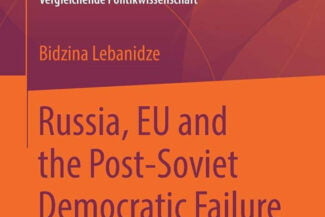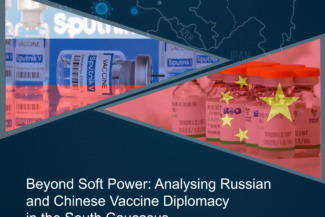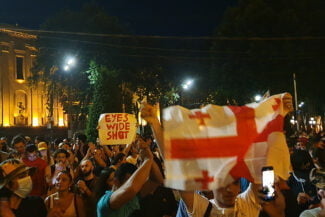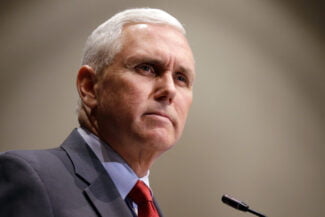Author
Irakli Sirbiladze
Irakli Sirbiladze*
On April 13, 2018, in response to reports of the alleged use of chemical weapons by the Assad regime in Douma, Syria, the United States, United Kingdom and France (Three out of the five permanent members of the United Nations Security Council, hereinafter referred as P3) launched ‘precision strikes’ on the chemical weapon facilities in Syria. The joint military action was preceded by a series of UN Security Council meetings and an exchange of threats between Russia and the United States over the consequences of the anticipated strike. Similar, albeit smaller, military strikes were already carried out by the United States in 2017 in response to the Khan Shaykhun chemical attack executed by the Syrian regime.
The use of chemical weapons has been reported in Syria and elsewhere over the past several years. During the Syrian Civil War, 34 documented cases of the use of chemical weapons by various parties to the conflict have been reported, according to the Independent International Commission of Inquiry on the Syrian Arab Republic. The use of a chemical nerve agent by the Russian Federation on UK soil is also indicative of this trend.
The P3’s attack on Syria was primarily intended to prevent and deter the further use of chemical weapons in Syria in particular, and in armed conflicts in general. The military strikes in Syria have also sent a message to Assad and Putin that, unlike the Obama administration, the current US administration is ‘locked and loaded’ and will take military action whenever it deems necessary.
The rationale behind the actions of the US, UK and France
The concerted military actions taken by the US and its two closest allies did not solely seek to uphold the international ban on the use of chemical weapons; the allied actions also implied wider strategic and geopolitical calculations. Notwithstanding the lack of a comprehensive US strategy vis-à-vis Syria, the emergence of the axis of Russia, Iran and possibly Turkey presents a danger to US positions globally. The show of force by the United States, and the inability of Russia to counter US military posturing, sends a signal to potential challengers to US-led international order that the USA knows who its strategic competitors are and stands ready to counter them. The newly adopted National Defense Strategy of the United States, which declares intra-state strategic competition as ‘the primary concern in the US national security’, is a testament to this view.

U.S. Ambassador to the United Nations Nikki Haley holds photographs of victims during a meeting at the United Nations Security Council on Syria at the United Nations Headquarters in New York City, NY, U.S. April 5, 2017. REUTERS
The military strikes by the United States against Syria are also motivated by Donald Trump’s domestic calculations. Despite Trump’s announcement that the US is planning to get out of Syria, the president was still committed to carry out the precision strike in Syria. Apart from the traditional strategic determinants of the strike, Trump aimed to differentiate his presidency from the previous administration, when Barack Obama failed to meet the red line he set. At the UN Security Council meeting, Nikki Haley, the Permanent Representative of the United States to the United Nations, remarked that “when our president draws a red line, our president enforces the red line”.
The United Kingdom and France also had their own motives when they supported the US decision to carry out the strike. Following Russia’s use of a nerve agent in an attempted assassination of a former spy and his daughter on UK soil, the UK utilized the strikes to hold Russia accountable for its role in Syria, including alleged tempering with the chemical site, and to portray Russia as a malign actor in international relations. In her address to the nation in the aftermath of the strikes, the British PM underlined that the strikes “should also be a message to others that the international community is not going to stand by and allow chemical weapons to be used with impunity.”
The decision of French President Emmanuel Macron to join forces with the USA was also aimed at upholding the red lines that he set vis-à-vis Syria: the use of chemical weapons against the Syrian population and humanitarian access to Syrian civilians.
Syrian Civil War: Change or Continuity?
The recent military airstrikes in Syria were not part of a wider strategy and did not attempt to change the status quo in Syria. While explaining the thinking behind the attack in Syria, Theresa May remarked that the strike “was not about interfering in a civil war and it was not about regime change”. In his address to the nation, Trump also announced that “America does not seek an indefinite presence in Syria”.
The US strategy in Syria is limited to fighting against ISIS and does not include policy calculations designed to bring an end to the civil war in Syria. As diplomat and Middle East specialist Martin Indyk suggests, Trump’s “strategy is to limit American involvement, to push responsibility for outcomes in the region back onto states in the region, and to let power determine outcomes”.
The status quo in Syria remains advantageous for Bashar Al Assad, however. Despite the fact that his ability to use chemical weapons as a method of warfare has been limited thanks to the Western airstrikes, it is still believed that Assad, with the help of Russia and Iran, will emerge victorious in the civil war unless there is a significant policy change in Western countries that outlines a broader strategy of engagement in Syria.
Western-Russian Relations amid the military strikes in Syria
The relations between Russia and the Western countries started to deteriorate in 2008 and have been further exacerbated since the annexation of Crimea and the war in Ukraine. Russian attempts to interfere in the US presidential elections and the use of nerve agent on UK soil have brought Western-Russian relations to a new low.
The latest strikes in Syria proved to be the closest point of potential military confrontation between Russia and the West since the end of the Cold War. The nature of the targeted strike on chemical sites in Syria and the existing deconfliction channels between Russia and the USA limited the possibility of a military confrontation between two nuclear powers, however.
Amid the imposition of various sanctions on Russia and the series of diplomatic expulsions in response to the nerve agent attack in Salisbury, UK, Western countries and Russia are now entering the phase of the so-called chicken game when neither side shows the willingness to swerve to avoid a collision.
Annuit coeptis: What shall Georgia do?
The Georgian reaction to the military action taken by the P3 countries has been limited to a supportive tweet by the Minister of Foreign Affairs of Georgia. While Georgia’s policy options in relation to the Syrian civil war are rather limited, statements of support to the partners of Georgia, including vocal support at the UN when possible, are good ways to align with the country’s allies as they attempt to counter Russian revisionism.
In addition, as Georgia has no direct role to play in the Syrian civil war, it must further commit its support to fighting against ISIS.
Moreover, as Russian-Western relations are escalating towards strategic rivalry, Georgia should clearly position itself as part of the emerging coalition against Russia. Furthermore, Georgia shall utilize Western unity against Russian revisionism in order to advance its national interests and hold Russia accountable for its aggression in Georgia.
*Irakli Sirbiladze – PhD Candidate in International Relations at Tbilisi State University.







